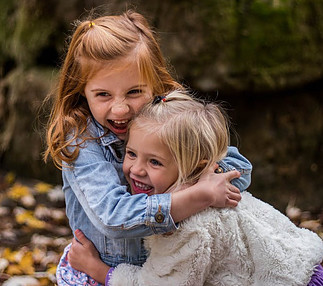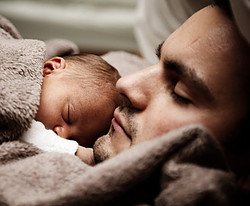Do humans need hugs? As humans, we crave touch as much as we crave water.
One thing I have really learned through this time of social isolation is that I need to hug.
It is no secret that the act of hugging is a great way to reinforce the closeness between people.
Hugging has the power to calm us when we are upset, which reduces tension within our bodies.
A warm hug can reduce the feelings of anxiety and depression and can reduce our sense of loneliness.
During these times of social isolation, the feelings of loneliness can be even stronger.
Here in New Brunswick Canada, our provincial leaders have told us we could extend our “bubble” to one other household. For us, that meant we could get together with our daughter and her family.
So last night we got together for supper and the first visit since being isolated. The hugs were the best part. We couldn’t stop hugging one another.
I didn’t realize how much I missed hugging my family members until I couldn’t.
That first hug with each of those precious grandchildren was the best feeling in the world and I realized that it is more than just wanting a hug, “I need to hug”. It is a need as much as drinking water or breathing air is a need.
Table of Contents
Benefits of Hugs

We hug for many reasons. We hug when we are happy, sad, or offering comfort to someone else who may be sad.
According to scientists, the benefits of hugging is proven to make us healthier and happier.
Let’s explore how.
- A good hug can reduce stress by showing support. When a family member is going through something stressful a warm embrace can go a long way to comforting them.
- Hugs may help prevent illness by reducing stress and we all know stress can cause many illnesses.
- May boost heart health by reducing blood pressure and heart rate both of which are good for your heart.
- Make you happier because hugging causes your body to release oxytocin (our feel-good hormone) which makes us feel happy.
- Help reduce fears, scientists discovered that touch reduces anxiety in those suffering from low self-esteem. They even discovered hugging a “teddy bear” can help reduce fear.
- Reduce pain. There was a study done where fibromyalgia patients received six therapeutic touch treatments. The treatments were just light touches on the skin. Each participant stated they had increased quality of life and reduced pain. Hugging is a form of touch and therefore may help reduce pain.
- Help you communicate because hugging is a very comforting and communicative form of touch. A hug can express love, empathy, sympathy, gratitude, and happiness to name just a few.
Why we Need Hugs

A good hug is the fastest way to get oxytocin flowing. A hug will lower your blood pressure and reduce your cortisol (stress hormone).
A warm hug will help us maintain happier and more fulfilled relationships
Being hugged by our partner makes us feel sexier and helps improve our intimacy.
Hugging will strengthen the bond with the people you love.
Regular hugging will boost health and immunity, keeping us healthy
Hugs are a great way to relieve stress and anxiety.
Hugs are an Important Part of a Child’s Development
Human touches are very important to brain development and growth.
Our daughter-in-law gave birth to premature twins and while in the NICU the nurses had both her and our son spend several hours each day snuggling the babies with skin-to-skin contact.
These times of nurturing and gently hugging their children were essential to their development and eventual release from not only the NICU but the hospital.
Developing the brain will ultimately result in creating smarter kids because their brains were able to develop fully because of the stimulation caused by hugging.
Physicians have stated that children require physical contact to properly grow. Failure-to-thrive is a type of growth deficiency caused by a lack of physical contact and can be improved by providing nurturing touches and hugs.
Hugging releases oxytocin which can strengthen immune systems and lowering the plasma levels of thyroid hormones which aid in faster healing of wounds.
A well-timed hug from a parent can stop a temper tantrum before it is out of control. Children often have temper tantrums because they are overwhelmed with feelings they haven’t yet learned how to cope with. The calming hug from an understanding parent can help calm the child. Helping to build their resilience as they learn to deal with big emotions.
Regular hugs with a parent make kids happier and certainly increases the bond with parents.
Relieve Stress
We understand that stress can cause increased levels of cortisol which can have a damaging effect on our bodies and overall health.
A simple hug releases oxytocin which then causes the cortisol levels to diminish.
Another important factor is the mental health aspect.
It is human nature to experience the need to belong. A warm hug from a family member or friend nurtures that sense of belonging that runs so deep in each of us.
Feeling a strong sense of belonging also helps keep those cortisol levels reduced which helps keep us healthy.
Conclusion
As parents and grandparents, we can certainly aid in developing strong, healthy intelligent children who have a strong sense of belonging simply by hugging our children and grandchildren often.
When I could finally wrap my arms around my grandchildren yesterday it truly was the best feeling in the world. I hugged them so tight but I also got hugged just as tightly in return.
Until yesterday, I did not realize just how much I missed hugs.
Hugs are very important to not only our physical health but also to our mental health.
I don’t know about you but I am anxiously awaiting the day we can reach out and hug the rest of our family and friends.
I think the biggest thing I learned about myself through this time of isolation is how much I truly need a human touch to thrive.
Those hugs yesterday have given me a renewed sense of self. I feel stronger and better able to do what we must do to ensure we can further reduce restrictions in the weeks and months to come.
Hug each other gently and often and stay safe.
Thanks for dropping by, please leave your comments below. I will respond.

